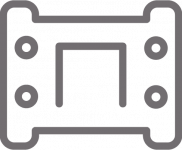Innovative STEM/STEM Education - Microduino

“My partners and I wanted to create something that anyone could use to imagine a product and immediately just build it,” said Bin Feng, Microduino’s co-founder and Chief Executive Officer. Bin and his partners developed Microduino modules to lower the barriers to creativity, and enable everyone, from kindergartners to university students, to design all kinds of innovative and interesting electronic do-it-yourself (DIY) projects.
Launched in 2012, Microduino is an award-winning global designer, developer, manufacturer and seller of stackable electronic building blocks, related components, and in-class science, technology, engineering and mathematics (STEM) learning systems.
In August 2013, Microduino announced its first project on Kickstarter: the world’s smallest Arduino-based board at the time. It not only reached, but exceeded its goal, by 600% in less than 30 days.
In 2015, Microduino launched the unique mCookie product series which is an adaption of the original Microduino DIY series of technology components. mCookies are the cornerstone of Microduino’s DIY, Consumer and STEM/STEAM educational products.
Microduino continued on its roadmap of innovation.
- October 2016: ITTY BITTY CITY, for children ages eight and up, debuted on IndieGogo in October 2016, and shipped on schedule at the end of that year. Itty Bitty City is a complete 8-in-1 project kit that features Microduino’s mCookie Series modules. Each of the eight projects introduces new concepts and ideas related to programming and electronics. ITTY BITTY CITY initially became popular with the consumer/DIY audience. With the growth of maker spaces in schools driven by STEM/STEAM initiative in the education market, ITTY BITTY CITY found new fame as it provided opportunity for logical thinking and problem solving skills. Today Microduino is one of the leading companies developing solutions for STEM/STEAM education worldwide.
- August 2017: Microduino introduces mPuzzle, which teaches basic circuitry coding concepts for children ages five and up.
- January 2018: Microduino introduces mPie, a transitional kit for children ages seven and up that moves them from the basics of circuitry and hardware components of mPuzzle to initial concepts of coding.
- Spring 2018: Microduino launches its MIX Kit Series, exclusively for the education market, to increase students’ interest and proficiency in STEM/STEAM skills. The series of 4 MIX kits are aligned with current STEM curriculum standards. Rather than focus on one application, each kit level offers 12 projects, and encourages students to use what they have learned to build their own designs.
Microduino teamed with teachers, administrators, academic experts and visionaries to develop the series of four powerful learning systems that progressively teach children, as young as five years old, basic electronic circuitry, coding, and product design. Each subsequent MIX Kit focuses on more advanced and sophisticated concepts so students can further their abilities to think logically and sequentially, and solve life and technology-focused problems.
- Fall 2018: Microduino builds on its popular ITTY BITTY CITY with the introduction of a robust, value priced ITTY BITTY BUGGY. With all the fun of a true toy, this new generation of CPT (Code Programmable Toy) provides light coding from smartphones/tablets to in-depth coding in Scratch, Python and C++ for the more experienced user.
LOWERING THE BARRIERS TO STEM EDUCATION – THE WHY AND THE HOW
Microduino modules are small, easy-to-use, LEGO® and Arduino-compatible electronic building blocks that simply snap together with magnetic connectors. There are 50 different modules with 30 different kinds of sensors — creating a huge platform for creative design. Each module has its own function, such as Wi-Fi, Bluetooth, GPS, or LED light. By stacking together the modules needed for a particular application, kids can easily complete the suggested designs, or put their imagination to use and create an unlimited number of objects, using critical thinking skills.
Because all required parts are included in each unique Microduino modular system, there’s no need to spend time identifying and shopping for more. Even better, it is not necessary to have previously required knowledge of circuit design, diagrams, soldering and breadboarding. With Microduino, what might otherwise take weeks to make can be accomplished in days or even hours. This means kids can explore new technology faster — without the fear of failing. The result: they gain a sense of pride, self-confidence and delight in discovering their untapped creativity. They learn that they can be creators and “makers!”
Six Continents, Three Million Users
Microduino is currently in use on six continents. More than 3 million students from kindergarten to college have experienced Microduino’s magic. The company even has an accredited two-unit course at Tsinghua University, considered “The MIT of China.”

100+
Modules

3 Million+
Students (Worldwide)

1000+
Wiki Pages

5000+
Schools
Members of the Microduino community – students and individuals — have conceived and created an extraordinary array of impressive and impactful projects for real-life use, including 3D printers, smart music players, gloves that translate foreign languages, miniature cellphones, water pollution detectors, and many more.
The company has also worked with Britain’s International Centre for Birds of Prey on a conservation project through which Microduino modules collect insightful data used to help endangered vultures.
Microduino has received multiple awards including the IDSA Gold Award from IDEA 2016 (the “Oscars” of the design world), and the Editor’s Choice 2017 Award at Maker Faire. Electronic Engineering Journal included Microduino as one of “The 5 Best Things from World Maker Faire 2015.” Time Magazine called Microduino’s mCookie one of the top five STEM education kits on the market today. Microduino’s mCookie line is on permanent display at the Henry Ford Museum in Detroit Michigan. Microduino also won the coveted KAPi Award for 2019, presented at CES in Las Vegas.
Microduino products are currently available for sale in the US and world wide, on the company’s website, www.microduinoinc.com, Amazon, and at select retailers, such as Barnes & Noble, Fry’s, RadioShack and more.
Microduino worldwide headquarters are based in Westlake Village, California. Microduino is an award-winning global designer, developer, manufacturer, and seller of:
- Stackable electronic building blocks
- Related accessories and peripherals
- In-class science, technology, engineering, and mathematics (STEM) learning systems